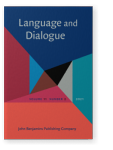Vol. 11:2 (2021) ► pp.246–270
The types and functions of humor in the work of a United States Senator
A case study of Senator Edward Kennedy
This study investigates the role interactional competence plays in the performance of political roles by examining the use of humor in events such as speeches, election campaign rallies, press briefings and televised news interviews. In this case study of a prominent United States Senator (the late Senator Edward Kennedy), twenty publically available video recordings from the C-SPAN online archives are analyzed using a conversation analytic approach. Two main types of humor were found in these data, self-deprecatory humor and humor that criticizes others. Three main functions of humor were identified (subtle self-promotion, managing challenging political and interactional situations, and creating solidarity with an audience). The results of this study contribute to our understanding of how humor can play a role in doing the work of a Senator.
Article outline
- 1.Introduction
- 2.Literature review: Humor and politics
- 2.1Self-deprecating humor
- 2.2Humor as criticism
- 3.Methods and data
- 4.General observations about the use of humor in the data set
- 5.Humor, social role and interactional competence
- 5.1Self-deprecatory humor
- 5.1.1Self-deprecatory and self-aggrandizing humor
- 5.1.2Self-deprecatory humor based on a surprise contrast
- 5.1.3Self-deprecating humor through fictional story telling
- 5.1.4Self-deprecating humor through ‘pretend ignorance’
- 5.2Humorous criticism of others
- 5.2.1Humor through direct criticism
- 5.2.2Humor through indirect criticism
- 5.2.3Pretend criticism: Humor from obviously fake attacks
- 5.1Self-deprecatory humor
- 6.Discussion and conclusions
-
References
